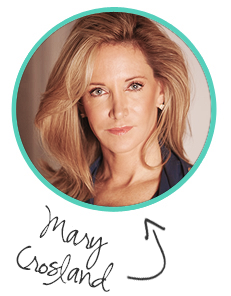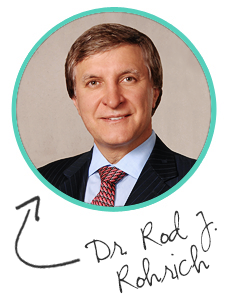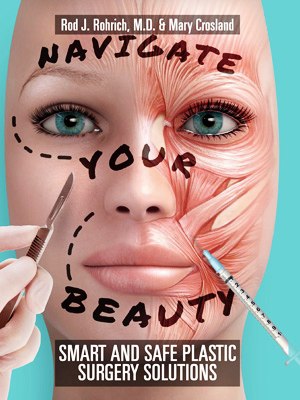He’s a prominent board certified plastic surgeon in Dallas and she’s the owner of St. Lucien, a prestige beauty salon, not to mention one of the doctor’s loyal patients. Together, Dr. Rod J. Rohrich and FOF Mary Crosland wanted to write a book that would help women choose the right professional for their surgical and non-surgical procedures, no matter where they live or what procedure they’re having. The result—Navigate Your Beauty: Smart & Safe Plastic Surgery Solutions—is a must-read for anyone about to start a doctor search or even contemplating having a procedure.
FOF’s Geri Brin asked Mary and Dr. Rohrich to tell us what motivated them to take on the book project and why plastic surgery patients choose the wrong doctors.

What are your backgrounds?
Mary: I’m married and have a daughter, son, three stepchildren and six step grandchildren. I’m originally from Michigan and Ohio, but studied business at Southern Methodist University in Dallas and have been here for 30 years. I’m only involved in the business end of my salon.
Dr. Rohrich: I grew up on a ranch in North Dakota. After graduating from Baylor University College of Medicine in Houston, I trained at the University of Michigan Medical Center, then did craniofacial and pediatric plastic surgery residencies at the Radcliffe Infirmary at Oxford University in England, where penicillin was discovered. I also did a fellowship at Mass General Hospital/Harvard Medical School in Boston. I came to Dallas in 1986 and I am Chairman of the Department of  Plastic Surgery at The University of Texas Southwestern Medical Center.
Plastic Surgery at The University of Texas Southwestern Medical Center.
I’m a hand surgeon, a craniofacial surgeon and an ASPS board certified plastic surgeon. My practice is primarily cosmetic today, but I do it all.
Mary, what led you to Dr. Rohrich?
He worked on a ruptured implant. I’ve also had fillers and a lower facelift.
What differentiates your book from other books on plastic surgery?
Dr. R: The book is in a class by itself because It’s written to level the playing field between a plastic surgeon and a consumer. We give consumers the truth about how to find the right plastic surgeons to assure them the the best and safest outcomes. Mary is an advocate for consumer safety.
This is not a self-promoting book, where I say: ‘I’m great. You should come to see me. Here are examples of what I do.’ We talk about how to be safe, stay safe and get good and safe outcomes, wherever you are in the country. We’re not saying everyone needs to come to Dallas, but that wherever you live, these are the three magic questions you should ask to find to the right doctor to perform the procedure you want. No book in medicine does that like this book does.
Mary: It’s written from two voices: the science end and the consumer end. But it’s a very easy read. Everything you need to know without confusion.
So what are the three magic questions to ask prospective doctors?
Dr. R: The answers to the following questions reveal in an instant whether you’re dealing with a trustworthy professional or someone who could do you far more harm than good.

- Is this one of the top three surgeries you perform and how often do you do it? The answer reveals a doctor’s experience.
- Do you teach, speak or write about this procedure for the benefit of other plastic surgeons? This answer reveals a doctor’s expertise.
- Do you have long-term follow up photos for this procedure? This answer shows consistent, exceptional results.
When was the AHA moment to make you decide to do the book?
Mary: I had referred so many patients to Dr. R and I kept hearing the same questions from friends and friends of friends, people from Texas and out of Texas. But there was no real information, no book, on how to pick the correct plastic surgeon and on procedures to help the consumer through the process.
Dr. R: Today, baby boomers want to look as good as they feel, for as long as they can. I see a lot of botched plastic surgery from all around the world. It became tiring to hear the same story from patients: ‘But the doctor’s website looked good, his office looked good and he had these certificates on the wall.’
Of course, everyone’s famous on his or her own website, but the best websites don’t necessarily correlate to the quality of the plastic surgeon.
Our book equalizes that. Every website says the same things: ‘I’m great. I’m famous. I’ve done a lot and here’s what I can do for you.’ They may not even be plastic surgeons. It’s frightening.  The take-home message is we want people to empower themselves to make the right decisions about their health. Today, women spend more time looking for a purse or a pair of shoes than choosing a plastic surgeon. You can take the shoes back, but you can’t take your face back. Why is that happening? There was no ultimate source to prevent it. The book will be a consumer’s AHA moment.
The take-home message is we want people to empower themselves to make the right decisions about their health. Today, women spend more time looking for a purse or a pair of shoes than choosing a plastic surgeon. You can take the shoes back, but you can’t take your face back. Why is that happening? There was no ultimate source to prevent it. The book will be a consumer’s AHA moment.
Tell us all the things women do wrong when they’re looking for plastic surgeons.
- They spend more time looking for shoes than for a plastic surgeon.
- They’re impulsive. Just because you’re getting your hair done, doesn’t mean you should get fillers and Botox right then and there, at the salon. This is a medical procedure. You’re not getting your nails or hair done. We’re injecting things into your body.
- They don’t do research. Ask the three questions. Become as knowledgeable as the surgeon. If a doctor gets annoyed when you ask all these questions, you should leave. You want an informed physician.
- They don’t ask if we’re board certified by the American Board of Plastic Surgery.
- They don’t ask about the risks or the downside of the procedure, the consequences if something goes wrong. They’re too trusting and they go to the wrong surgeon.
- They think that just because someone is a board certified plastic surgeon that he or she is proficient with fillers. Not true.
- They don’t find out exactly what’s being injected into their faces.
- They’re not focused on what they want and they ask the doctor to tell them what he or she thinks they need. Write down the three things that bother you before you go for a consultation. Focusing on what you want prevents you from getting more than you need or want.
- They don’t ask the right questions about recovery and follow up, e.g. ‘When can they go back to work?’ It’s pretty sad.
Two more things to consider: A good surgeon will honestly tell you which procedures he or she thinks will benefit you and which won’t and why he won’t do them. Also, if a doctor can do your surgery the next day or the next week, you should be concerned.
What if the shape of my nose doesn’t bother me, but the doctor thinks I should have a nose job?

Dr. R: This is want surgery, not need surgery. So we have to make the patients happy and improve the way they look and feel about themselves. We shouldn’t give a patient bigger lips if her lips are already big, but we should recommend rhinoplasty if we feel it will improve her looks.
Are women looking to get back youth? Is it a mistake to want to look younger?
Mary: If you can look youthful, that’s great, but it’s all about moderation. Some of my friends have had fillers or facelifts and six months later, they want more filler. You don’t want to look ‘too done.’ You want to look great, but not different. After my lower facelift at 52, nobody said I looked different. They said ‘Wow, you look really good.’
Dr. R: It’s better to do your face and eyes before you think you need to. That way, you still have the power of your youth to help make the results look good. A facelift at 50 will look better, last longer and look more natural than one at 65 or 70. You’ll also need to have a lot less work. Your genetics are important, as well.
Not everyone can afford plastic surgery. What do you tell a woman who desperately wants to have work done, but just doesn’t have the disposable income?
Dr. R: Prioritize what you want in your life, the things that are important to you. Of course, your family and kids are Number 1. But then invest in yourself, even if it takes time to do it.
You can do other things, short of surgery, to make yourself look better, including proper skin care, diet and exercise, using sunscreen. Half of our book talks about ways to accentuate your  looks without surgery.
looks without surgery.
But if you’re going to have an invasive procedure, don’t go to the lowest bidder. It’s like going to Walmart versus Neiman Marcus. You get what you pay for.
But remember, you also aren’t going to get the best results just because a doctor charges a fortune. If a surgeon gives great answers to the three magic questions, it’s highly likely he or she will be the right doctor.
Choosing a doctor based merely on cost won’t serve you well. You might need to have the procedure redone and the cost will be astronomical in the long run. Also, the results will never be the same as if you had done it right the first time.
What do you think about websites that let a patient rate and review doctors?
Dr. R: Their goal was initially laudable. But these websites have turned into commercial nightmares. Look at Yelp and Angie’s List. They’ve both had class action suits against them. Sites have posted false ratings for a restaurant, for example, then tell the restaurant: ‘We can fix that.’
Competitors post negative ratings on sites. These online ratings can be modern ways to scam someone. Since the process isn’t regulated, it’s almost meaningless. Nevertheless, positive ratings seem to work and can increase business.
A portion of the proceeds from the sales of Navigate Your Beauty will support the AIRS Foundation (Alliance for Reconstructive Surgery), which is dedicated to educating women about the options for breast reconstruction following mastectomies and providing funding for reconstructive surgery.



